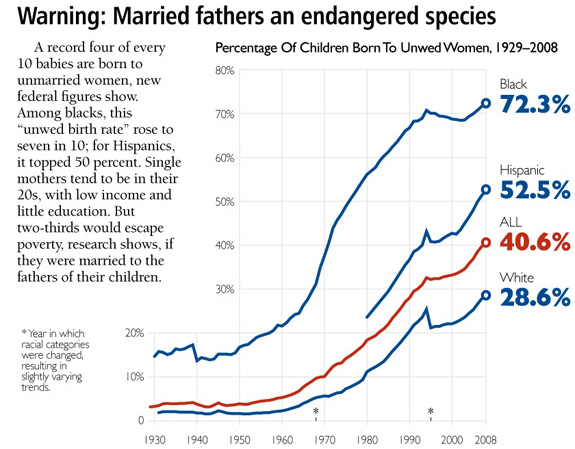numberwang said:
sundin13 said:
Do you have any evidence that these links were causal?
Further, I struggle to believe that such a change would aid in the creation of healthy relationships. If the only reason parents get back together is for the tax breaks, that probably isn't a healthy family.
|
It is certainly Granger-causal, the strongest from of causality that can be empirically tested, as the 'war on poverty' preceded the degeneration of society. There was a time when things were different.
|
First of all, you didn't really post anything in the way of evidence of a causal link. I am asking for evidence to be posted, not for you to simply make comments that evidence exists.
Further, you seem to have deleted half of my post. I would like a response, as it is important, given the fact that it made up over half my post:
Either way, to some extent, single parenthood is inevitable. The second step of fighting the negative consequences of single parenthood (the first being reducing the single parenthood rate) is to fight the negative repercussions of single parenthood. This means fighting issues like the poverty of single mothers, and the reduced time parents have to spend with their children. Welfare is one of the more clear avenues, with assistance in parenting close behind. I also suggested improving parental leave programs, however I would expect that to have a significantly lesser impact. How do you propose tackling this side of the issue? To ignore this angle would be to only address a piece of the problem you are discussing.
Now, I would like to post the results of my searches:
Welfare reform in the mid '90s has virtually no effect on a number of variables such as marriage rate, divorce rate, and birth rate to unmarried women. Commonly, primarily conclusions on this front are that there is either no behavioral effect or a small behavioral effect due to this welfare reform. Further studies indicate fairly scattershot results with no consistent pattern.
From what I've read, largely seems to mirror the conclusions from above. The effects are often found to be small or insignificant or contradictory, but this is a bit of a read, so I admit I didn't go through it with a fine-toothed comb.
And again, similar results to above. This one is probably the easiest to read. It presents a meta-analysis of other studies in a way that is easy to understand what the important points are. I've posted a couple quotes below.
"The meta-analytic results further show that these programs generally did not affect marriage or cohabitation overall or for most subpopulations characterized by the parent’s -21- age; prior marital status; race or ethnicity; prior welfare and work experience; and the age and number of her children."
"despite the scattered effects on marriage that have been reported in earlier studies, we conclude based on the evidence presented here that these welfare and work programs — at least in the short run — had few effects on marriage and cohabitation for single parents, whether for all the programs combined, for particular program types, or for subgroups. This conclusion is in line with economic and sociological theory, which provides no clear prediction about the effects of changes in economic circumstances on marital behavior, and with the past and emerging non-experimental literature on marriage, which has failed to find any consistent effects."
This one is just an abstract, but I wanted to include it just quickly as it discusses the improved economic stability of women in areas with stronger welfare systems.
"Multivariate analyses show that welfare state arrangements temper the economic consequences of divorce for women. "















































